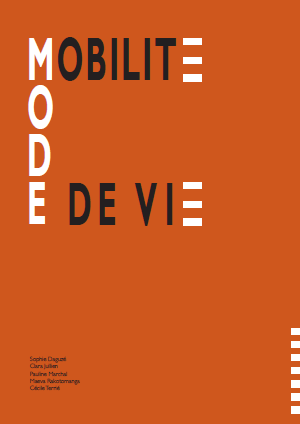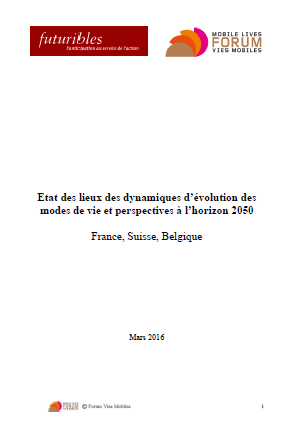
The Mobile Lives Forum highlights the necessity to (re)think the role of mobility in our societies in order to imagine lifestyles that are more desirable and sustainable. Researchers, activists and citizens who have chosen to lead atypical lifestyles in France, Switzerland, or Belgium participated in a workshop to discuss the doors these mobile lifestyles open for the future. Discover interviews with these lifestyle pioneers, as well as the findings of the prospective reflection that followed. Food for thought to imagine how mobility in the future will differ from that of today.
In order to enrich the reflection on the future of mobile lifestyles, the Mobile Lives Forum organized an exploratory workshop on atypical lifestyles. Held in Morges, Switzlerand over a period of three days in March 2016, the workshop brought together approximately twenty people 1 researchers, activists, and citizens.
The floor was first given to citizens who have made significant life choices in terms of mobility, with the goal of understanding how their lifestyles are organized in space and time, the aspirations they fulfill, and how they could be adopted on a larger scale in the future.
Discover accounts from people who have made deliberate choices about their lifestyles and the role mobility plays in them. While some lifestyles are considered as a form activism, other have simply been built day-by-day over time. Each has found solutions to align their current lifestyle with their aspirations - be it living locally, having regular contact with nature, travelling year-round…
To go further, take a look at the findings of a study on little known, atypical or emerging desired lifestyles, conducted during a professional research project with the Master of Land Use Planning and Urbanism at the Université Paris 1 Pantheon-Sorbonne (in French).

The workshop then focused on the doors these lifestyles could open for mobility in the future. Could they be adopted on a larger scale in the future? Could the underlying values and practices resonate with a wider population? Could they help create a more sustainable society?
This reflection was based on a study of recent lifestyle evolutions and trends and how they could affect the future of mobility in 2050 (France, Switzerland, Belgium), conducted by Futuribles for the Mobile Lives Forum (in French).

In order to facilitate discussions about the future, the different lifestyles were grouped into three families:
A 2050 projection was made for each lifestyle family: if these were to become mainstream lifestyles, how would they change the organization of society and territories?
Both scenarios could create challenges for social cohesion: risks of isolation and of an increase in territorial and social equalities, the rejection of other lifestyles (in defense of ecology notably).
In either case, an actor or network of well-coordinated actors - public or private- manage the entire transportation system. Informal carpooling is used for short distances, such as in residential areas or for work. Lifestyles are different in cities (planes, public transportation, carpooling, car sharing, walking, bicycling) than in less dense areas (on demand transportation, electric cars, bicycles). This seems like an unlikely solution for isolated rural areas.
For both scenarios, challenges were identified regarding urban congestion and cost. Large investments are needed to create and maintain the infrastructures and services this lifestyle requires. If financed collectively, this would represent a large portion of public finances; if financed by users, this could raise concerns about equal access to rapid and comfortable services.
The last phase examined the synergies and tensions between the different families of lifestyles. It became evident that each model has its limits: the capacity of each model to be adopted across the general population or territories, social or environmental risks (increase in social inequalities, inability to combat climate change…) etc. However, these limits can be overcome by focusing on how these lifestyles complement each other.
The three families of lifestyles can be considered as three, interconnected ways of life:
Moreover, a diverse ecosystem of lifestyles could offer resilience in the event of ecological and economic crisis. Each lifestyle is vulnerable to certain shocks and resistant to others. The vulnerabilities of one lifestyle are not the same as those of another, and in the event of a shock this could help to avoid a general meltdown. If there was a crisis in one sector, a diverse ecosystem of lifestyles could help to prevent the crisis from affecting other sectors of the economy, society, or territories. Moreover, one of the existing lifestyles could also provide solutions.
Although these lifestyles are complimentary, they also create tension regarding the allocation of space and economic resources, economic and judicial systems, and the rhythm of society. These tensions highlight the need for collective decision making:
For the workshop participants, ideally people could easily transition, depending on the period of their lives, from one lifestyle to another. It is important to avoid separating these lifestyles by territory, in order to prevent the creation of lifestyle classes that lead to power struggles and confrontation. In order to make it possible for these lifestyles to coexist, it is necessary to create open urban models that allow for various lifestyles to take form in the same space.
This exploratory workshop confirmed the Mobile Lives Forum’s desire to better understand current lifestyles and aspirations in order to envision the mobility systems of tomorrow. This is just the first step of a process that will be enriched and consolidated. The Mobile Lives Forum will continue to explore aspirations for mobile lifestyles in future research projects..
1 We thank all participants:
Aurélie, Aline, Dorothée, Eric, Jean-Christophe, Kim, Thomas, Sonia, representatives of atypical lifestyles; Cécile Desaunay, Futurist (Futuribles); Javier Caletrio, Rodolphe Dodier, Vincent Kaufmann, Catherine Morency, Luca Pattaroni, researchers specialized in lifestyles and/or mobility; Clara Jullien, Maeva Rakotomanga, Cécile Terrié, students in the Master of Management and Urbanism at the Université Paris 1 Pantheon-Sorbonne.A lifestyle is a composition of daily activities and experiences that give sense and meaning to the life of a person or a group in time and space.
En savoir plus xFor the Mobile Lives Forum, mobility is understood as the process of how individuals travel across distances in order to deploy through time and space the activities that make up their lifestyles. These travel practices are embedded in socio-technical systems, produced by transport and communication industries and techniques, and by normative discourses on these practices, with considerable social, environmental and spatial impacts.
En savoir plus xCar sharing is the pooling of one or several vehicles for different trips at different times. Three types of car sharing exist: commercial car sharing, peer-to-peer car sharing and “informal” sharing between individuals.
En savoir plus xTo cite this publication :
Elia Vanson-Magalhães Da Silva (02 February 2017), « Atypical Lifestyle Choices: an exploratory workshop », Préparer la transition mobilitaire. Consulté le 19 April 2025, URL: https://forumviesmobiles.org./en/project/3467/atypical-lifestyle-choices-exploratory-workshop

Projects by Forum Vies Mobiles are licensed under a Creative Commons Attribution-NonCommercial-ShareAlike 3.0 France License.
Permissions beyond the scope of this license may be available at contact.
Other publications